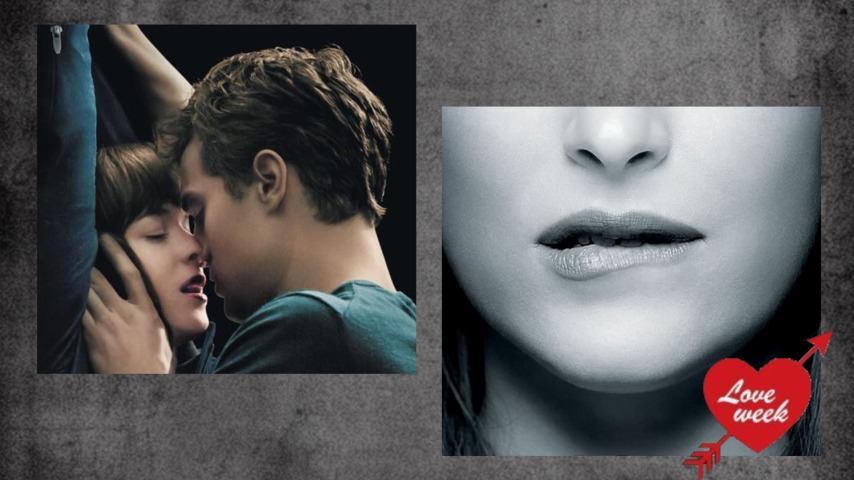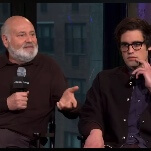Good soundtracks can happen to bad movies, and Fifty Shades Of Grey is a bad movie. It competes against itself at nearly every turn. In 2011, E. L. James, a 48-year-old mother from England, self-published the first book in the initial trilogy, which grafted her fantasies onto 20-somethings in Seattle modeled on Twilight characters. In 2015, Sam Taylor-Johnson adapted it into a film, inspired by erotic thrillers of yesteryear. This mismatch—including behind-the-scenes casting and production problems—resulted in a mess, which was correspondingly panned. So much of the story of Fifty Shades is made up of these clashing ideals that shouldn’t work together, and ultimately don’t. But tension is vital to art, and even if the film itself doesn’t work, all of these conflicts came together for a surprisingly solid soundtrack.
Even if you’ve never read or watched Fifty Shades, you’re certainly aware of it, if only as a punchline. The novel was born from a Twilight fanfiction originally called Master Of The Universe. We follow Anastasia Steele, a 22-year-old in her final week of college, as she meets Christian, an impossibly handsome billionaire. Ana has never so much as kissed a boy or been drunk, but she immediately falls head over heels for him. Then she discovers he’s into kink and BDSM.
Before the film was a twinkle in Hollywood’s eye, music held an important, recurrent place in the novel. It’s usually there to confer taste and to dump a bit of loam into the gulch that is Christian Grey’s personality. The first song referenced by name is “Flower Duet,” from Léo Delibes’ 1883 French opera Lakmé. The second is Kings Of Leon’s “Sex On Fire.” “My taste is eclectic, Anastasia, everything from Thomas Tallis to the Kings Of Leon,” the 27-year-old tells Ana, who swoons accordingly. It’s one moment of many that drives home the fact that, despite the young ages of its main characters, this is a piece of media born from the fantasies of a middle-aged British mother of two, and she didn’t bother to appropriately tailor her characters’ tastes to their ages and circumstances. Yes, Kings Of Leon was in the zeitgeist at the time, but despite its title, “Sex On Fire” is about as sexy as a fertility test. But these details humanize the largely blank Christian. He likes Springsteen and Sinatra and also Verdi operas but isn’t so self-serious that he can’t get down with a little Britney Spears. He contains multitudes.
The process of introducing the first Fifty Shades film to the world was complicated. Both Taylor-Johnson and James spoke about their tension on the set, and they received a decent amount of press, but both women kept the details rather vague. However, Fifty Shades was introduced to audiences with a rather ingenious first trailer. Beyoncé, who had freshly reached all-timer status with her 2013 self-titled album, was the ultimate symbol of sex, wealth, power, and generally having it all. Beyoncé was the first album she released after the birth of her daughter Blue Ivy and it remains her most sexually frank body of work. The record was widely acclaimed, and the marital strife of Lemonade was still two years away. Universal tapped her for its first trailer, and though she hadn’t seen the movie, completely understood what they needed. After a bit of back and forth about clearance, producers, and timeline, she remixed “Crazy In Love” into something slower, sexier, and more deliberate. Before people knew much else about the movie, they knew Beyoncé had co-signed it. From a marketing standpoint, it was an absolute coup, and it’s hard to imagine a better hypothetical option for what the movie needed at the time. It also doesn’t hurt that the song sounds really good.
For the remix, Beyoncé worked with Boots, the producer who crafted much of the self-titled album with her. That project dabbled in the genre then sometimes referred to as “PBR&B,” basically meaning R&B, but hipster. It’s Frank Ocean, The Weeknd, maybe a little Drake—three artists that would appear on this Beyoncé project or the next one. They took a very familiar piece of ear candy and submerged it. There are songs mentioned in the Fifty Shades books and some of them appear in the films, but they are a generation (or two) older than Anastasia and Christian. But to create a soundtrack for the film, the music supervisors and Universal executives wanted to make something new and contemporary, and Beyoncé and Boots’ work here defined the sound they were looking for. “We never expected it would become the signature riff of the whole franchise,” Mike Knobloch of Universal told Vulture in 2018 of Beyoncé’s slowed-down “Crazy In Love” vocal.
Going on to craft the rest of the soundtrack, they took a pretty long look at Beyoncé’s Rolodex. Beyoncé has another song on the Fifty Shades soundtrack, “Haunted,” and several of her album’s collaborators feature in the film’s music as well. Sia, who was blowing up in her own right in the summer of 2014 with “Chandelier,” had written Bey’s album opener “Pretty Hurts.” For the soundtrack, Sia contributed “Salted Wound,” a plucked pop ballad that reigns in some of her more bombastic instincts. And though it would be another year or so before they officially collaborated, Beyoncé and The Weeknd were already connected through producer Mike Dean, who had worked on her song “Partition” and worked with the latter on “Where You Belong” for the soundtrack.
The big Weeknd song from the soundtrack, though, is obviously “Earned It,” which did as much for the artist’s career as it did for the film. During his mixtape era, The Weeknd’s music was absolutely filthy. Almost too filthy for Fifty Shades—there’s nothing in this film nearly as explicit as the lyrics to “Or Nah” or even his “Drunk In Love” remix. But as Fifty Shades was coming, he experienced a breakthrough on Ariana Grande’s “Love Me Harder,” which not only exposed him to a wider audience, but also made him more respectable. The film was careful to present itself as not a porno and worked hard to maintain its R rating; The Weeknd had to toe the same line to become the massive star he is.
“Earned It” was very different from anything the artist had previously released, and there hasn’t been much like it since. It’s sexy and a bit sleazy, as is The Weeknd’s wont, but the strings and tempo make it more Robert Redford than Michael Douglas. Christian Grey is depraved, both in the more naive eyes of Anastasia and on the page, but there has to be some suaveness that makes this a fantasy. Thanks to The Idol, we know now just how well The Weeknd can play creepy, but he played “Earned It” just right. The track, scored by Danny Elfman during one of the film’s scoring sessions, complements the relatively minimal but dramatic percussion of the “Crazy In Love” remix. “Earned It” also nabbed the franchise’s only Oscar nomination, for Best Original Song.
But if the film has a signature tune, it’s Ellie Goulding’s “Love Me Like You Do,” which accompanies the best scene in the movie: Christian flying Anastasia from her college apartment to his Seattle penthouse in his helicopter. It’s perhaps counterintuitive that the best moment in a film nominally about BDSM is one of the most chaste. That’s because Fifty Shades Of Grey is only kind of interested in sex, and it certainly isn’t very interested in BDSM. “You’re a sadist?” Anastasia asks when she discovers Christian’s red room. “I’m a dominant,” he quickly clarifies. “It means I want you to willingly surrender yourself to me.” Fifty Shades is a fantasy of control and comfort, and how much of one you’re willing to give up in exchange for the other. The (tame) version of kink depicted in the film—handcuffs, blindfolds, perhaps some light flogging—is just a metaphor for that. But hopping into a private helicopter with a man you’ve known for two days is a better one. Yes, Christian can hurt Ana in the bedroom, but the danger feels more palpable in the sky.
Goulding’s song is one of the great pop songs made for a movie, up there with “Take My Breath Away” or “I’ve Had The Time Of My Life.” The track marries what Fifty Shades wants to be—steamy and aspirational—with what it is: a pulpy piece of fanfiction. Melodrama works really well for pop music. It doesn’t matter so much what the feeling is or the amount of nuance so long as it’s big. And the few moments that work in this film are the ones that go for broke. Ahead of the song’s final chorus, the instrumental drops out, Goulding hollers a huge “What are you waiting for!”, and the strings glissando into the loudest refrain yet. Ana is taking in the Seattle skyline from 3,000 feet in the sky, but it almost wouldn’t matter if they were riding the bus instead. “Love Me Like You Do” is the sonic leap of faith.
It’s a testament to Goulding’s song that this moment resonates because its implications certainly aren’t explored much in the film’s text. “Love Me Like You Do,” like most of the songs, carries the weight that the film can’t—or won’t—hold. The soundtrack is so effective that the music supervisors, if not the artists themselves, must have understood their responsibility to translate the film. The last sequence in the movie is jarring and bizarrely affectless; Ana fairly abruptly asks Christian to hurt her and decides she doesn’t like it. She angrily leaves his apartment. The elevator doors close. The end. The audience in the theater might even laugh. But then The Weeknd’s hazy falsetto floats in as the credits begin to roll. It communicates male vulnerability, and once again Christian makes a little bit of sense. It manipulates you into feeling something closer to what that scene is trying and failing to communicate.
That’s exactly why this soundtrack has held up for so long: The songs are as accurate to the plot as a horoscope, but they tell you what to feel and practically shake the feeling out of you. Melodrama is a good mode for pop music—maybe it could have been a better one for Fifty Shades Of Grey.
























![HBO teases new Euphoria, Larry David, and much more in 2026 sizzle reel [Updated]](https://img.pastemagazine.com/wp-content/avuploads/2025/12/12100344/MixCollage-12-Dec-2025-09-56-AM-9137.jpg)
















